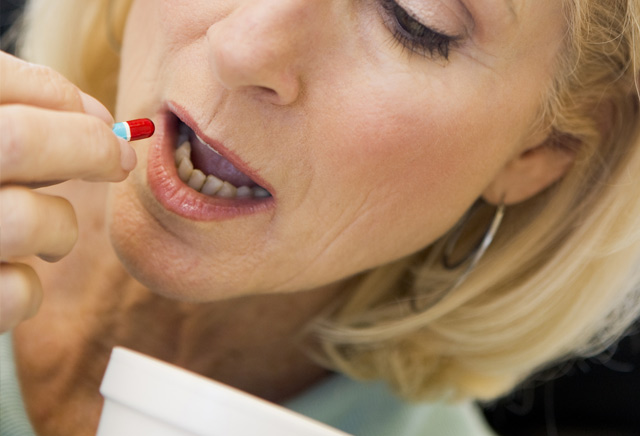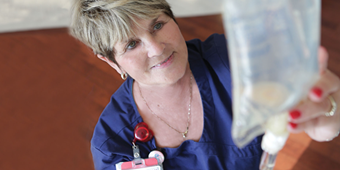Natural? Prescription? 5 Treatment Options for Menopause Relief

Answer a few questions and we'll provide you with a list of primary care providers that best fit your needs.
For women, menopause is a bit like death and taxes – it’s unavoidable. While you can’t do anything to prevent menopause or make it go away, there are some therapies out there that might ease the symptoms. Talk these over with your doctor before deciding which, if any, are right for you.
1. Menopausal Hormone Therapy (MHT), also called hormone replacement therapy
With MHT, your doctor might prescribe a combination of the female hormones estrogen and progesterone, or estrogen only. MHT is commonly prescribed in pill form. However, estrogen can also be given through transdermal skin patches (where the estrogen is absorbed through the skin) and vaginal creams.
The risks and benefits of MHT are complex. For example, MHT may increase or decrease your risk of colorectal cancer, heart attacks, stroke and breast cancer, depending on which therapy is chosen, your stage of life, and whether your menopause was natural or caused by surgery.
Other risks include an increased chance of gall bladder disease, urinary incontinence and lung cancer. Estrogen also increases the chance of getting endometrial cancer (cancer of the uterine lining). Adding progestin (a synthetic form of progesterone) lowers this risk.
On the upside, research indicates that MHT may decrease the likelihood of hip and vertebral fractures, an important benefit due to the higher risk of osteoporosis that comes with menopause.
“There is no simple answer as to whether MHT is the right choice,” says Brent Imbody, MD of Dayton Ob-Gyn Associates. “The solution varies greatly from woman to woman, and requires an in-depth discussion between the patient and her physician of all the risks and benefits.”
2. Non-hormonal Treatment
One example of a non-hormonal medication used to treat menopausal symptoms is paroxetine. Paroxetine’s active ingredient is a selective serotonin reuptake inhibitor (SSRI), used to treat moderate to severe hot flashes. The SSRI in paroxetine is a milder form of that found in anti-depressants. These medications (like most) carry their own risks, so make sure you discuss the risks and benefits with your doctor before going this route.
3. Estrogen Alternatives
These are "synthetic estrogens," like ospemifene, an oral medication used to treat pain during sexual intercourse. These improve symptoms of vaginal atrophy (thinning, drying and inflammation of the vaginal wall) without increasing the risk of endometrial cancer. However, these medications also have downsides, which you should discuss thoroughly with your doctor.
4. Natural Therapies
Homeopathy and herbal treatments may offer some relief from symptoms of menopause, but being “natural” doesn’t always mean a product is safe or effective. Common natural products include:
Soy. Soy contains plant substances (phytoestrogens) that may act like the estrogen your body makes. There is no clear proof that soy or other sources of phytoestrogens actually alleviate symptoms. Also, the risks of taking soy in pill and powder form are not known. If you are going to try soy, the best sources are foods such as tofu, tempeh, soy milk and soy nuts.
Herbs. These include black cohosh, wild yam, and valerian root. There is not enough evidence that these herbs (including pills or creams containing them) help with menopause symptoms. Also, not enough is known about the risks.
“There is no simple answer as to whether MHT is the right choice.”
“Although natural products don’t require a prescription, you shouldn’t take them without talking to your physician first, because the risks can be great,” says Dr. Imbody. “Also, tell your doctor about any medicines you are taking. Some plant products or foods can be harmful when combined with certain medications.”
5. Bioidentical Hormone Therapy (BHT)
BHT actually refers to man-made hormones that are the same as the hormones the body makes. There are several prescription BHT products that are well-tested and approved by the U.S. Food and Drug Administration (FDA).
Often, though, people use this term when referring to drugs that are custom-made by a pharmacist for a specific patient from a doctor's order. There is no proof that these are better or safer than drugs approved by the FDA, and many insurance plans do not cover them.
Answer a few questions and we'll provide you with a list of primary care providers that best fit your needs.
Source: Office of Women’s Health (U.S. Department of Health and Human Services); National Cancer Institute (National Institutes of Health); National Heart, Lung and Blood Institute (National Institutes of Health); Brent Imbody, MD, Dayton Ob-Gyn





